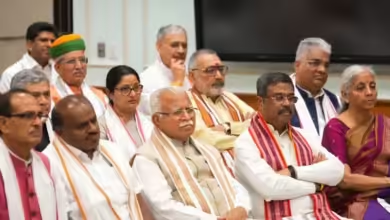
New Criminal Laws Set to Replace Old Regulations
The BJP-led central government has introduced 3 new legal laws, replacing the colonial-era extradition laws. The Indian Penal Code (IPC) of a century ago is to be replaced by the Indian Penal Code-2023. The new law, which will come into effect from July 1, reduces the IPC from 511 to 358 sections and adds 20 new crimes. Significant changes have been made in criminal laws.
Previously, perpetrators of rape, murder, or terrorism did not fear the consequences, confident that they could exploit legal loopholes to be released within a few years. However, now stricter punishments will be imposed for such crimes.
Also Read: Yogi Govt: Paper leak in Constable Exam leads to cancellation
1. Crimes Against Women and Children
The regulations regarding rape of women under the age of 18 have been revised. There are established rules under POCSO for gang rape of minors. Furthermore, rape of a girl under 18 years of age will result in life imprisonment or the death penalty. A new crime category has been introduced for gang rape of women under 18 years. Severe penalties and hefty fines will be imposed for deceitful sexual activities or false promises related to marriage.
2. Terrorism as a Punishable Offense
Under Section 113(1), terrorism becomes a punishable offence, with the possibility of imposing death penalty or life imprisonment without parole for terrorist activities. New crimes such as damaging public utilities and private property have been added. Provisions for compensating damages caused have also been introduced.
Also Read: TS Government to Implement Two More Guarantees
3. Treason
IPC Section 124A has been replaced with Indian Penal Code Section 152 to address acts of rebellion that threaten India’s sovereignty, unity, and integrity. While protecting the freedom of expression, this new section includes armed rebellion, destructive activities, and separatist actions.
4. Organized Crime
A new section has been introduced in the Indian Penal Code on organized crimes. Section 111(1) defines organized crime, making activities related to syndicates punishable. Armed rebellion, destructive activities, and actions threatening sovereignty now fall under organized crimes. Various penalties including the death penalty, imprisonment, and fines will be imposed for different crimes.
Other important regulations include:
New regulations have been introduced for mob lynching. Life imprisonment and death penalty will be imposed. Huge fines will be levied for causing disability or permanent disability. Zero FIR allows filing of FIR anywhere.





hey there and thank you for your info – I have definitely picked up
something new from right here. I did however expertise a few technical issues using this web site,
as I experienced to reload the site a lot of times previous to I could get it to load correctly.
I had been wondering if your hosting is OK? Not that I’m complaining, but slow loading instances times will
sometimes affect your placement in google and could damage your high-quality score if ads and marketing with
Adwords. Anyway I am adding this RSS to my e-mail and can look out
for a lot more of your respective fascinating content.
Ensure that you update this again soon.
Feel free to visit my blog post vpn special coupon
This website certainly has all of the information I needed concerning this subject and didn’t know who facebook vs eharmony to find love online ask.